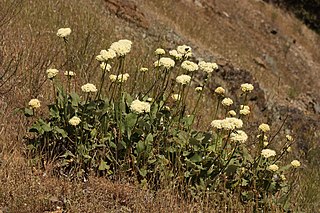
Eriogonum is a genus of flowering plants in the family Polygonaceae. The genus is found in North America and is known as wild buckwheat. This is a highly species-rich genus, and indications are that active speciation is continuing. It includes some common wildflowers such as the California buckwheat.
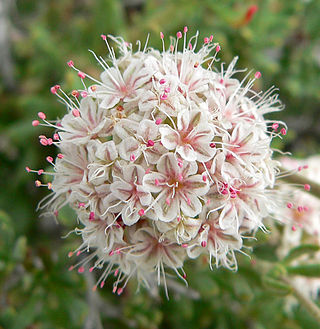
Eriogonum fasciculatum is a species of wild buckwheat known by the common names California buckwheat and flat-topped buckwheat. Characterized by small, white and pink flower clusters that give off a cottony effect, this species grows variably from a patchy mat to a wide shrub, with the flowers turning a rusty color after blooming. This plant is of great benefit across its various habitats, providing an important food resource for a diversity of insect and mammal species. It also provides numerous ecosystem services for humans, including erosion control, post-fire mitigation, increases in crop yields when planted in hedgerows, and high habitat restoration value.

Eriogonum arborescens is a species of wild buckwheat known by the common name Santa Cruz Island buckwheat.

Eriogonum cinereum is a species of wild buckwheat known by the common names coastal buckwheat and ashyleaf buckwheat.

Eriogonum maculatum is a species of wild buckwheat known by the common name spotted buckwheat. It is native to western North America from Washington to Baja California to Utah, where it can be found in a number of habitats, often in abundance.

Eriogonum ovalifolium is a species of wild buckwheat known by the common name cushion buckwheat. It is native to western North America from California to Alberta, where it is a member of many plant communities in varied habitats, including the sagebrush steppe and alpine regions.

Eriogonum pyrolifolium is a species of wild buckwheat. It is native to western North America, from British Columbia to the high mountains of California.
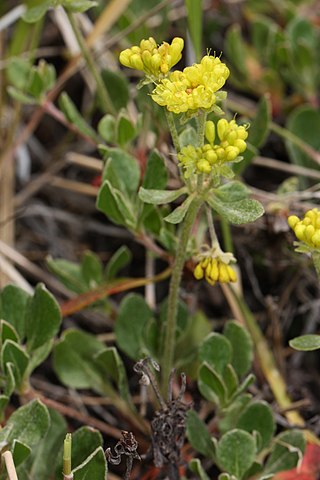
Eriogonum umbellatum is a species of wild buckwheat known by the common name sulphurflower buckwheat, or simply sulphur flower.

Eriogonum wrightii is a species of wild buckwheat known by the common names bastardsage and Wright's buckwheat. It is native to the Southwestern United States, California, and northwest Mexico, where it grows in many plant communities, such as chaparral, in rocky habitats from mountains to deserts.

Eriogonum grande is a species of wild buckwheat known by the common name redflower buckwheat. It is native to northwestern Baja California, as well as the Channel Islands of California. It is a mat-forming perennial herb producing tall, stout inflorescences of white, pink, or red flowers. Leaves are located mainly at the base of the plant and are wavy along the edges and up to 10 centimeters long.
Eriogonum argillosum is a species of wild buckwheat known by the common names clay buckwheat, clay-loving buckwheat, and Coast Range wild buckwheat. It is endemic to California, where it is known only from San Benito and Monterey Counties. It grows on clay substrates, often of serpentine origin. This is an annual herb up to 30 to 60 centimeters tall with a basal patch of oval-shaped, woolly leaves and a naked stem. The top of the stem is occupied by the inflorescence, a cyme with several clusters of tiny white or pink flowers.
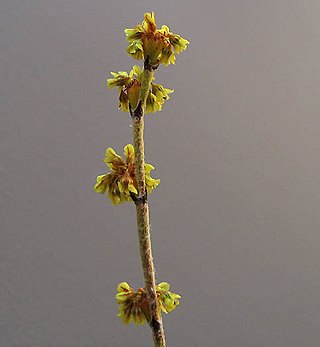
Eriogonum gracile is a species of wild buckwheat known by the common name slender woolly buckwheat.
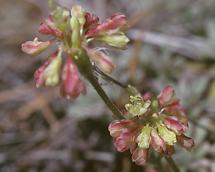
Eriogonum kelloggii is a rare species of wild buckwheat known by the common names Red Mountain buckwheat and Kellogg's buckwheat. It is endemic to Mendocino County, California, where it is known from only five occurrences on Red Mountain near Leggett. It grows in woodland habitat on serpentine soils.

Eriogonum kennedyi is a species of wild buckwheat known by the common name Kennedy's buckwheat.

Eriogonum sphaerocephalum is a species of wild buckwheat known by the common names rock buckwheat and round-headed desert buckwheat. It is native to the western United States.

Silene douglasii is a species of flowering plant in the family Caryophyllaceae known by the common name Douglas's catchfly.
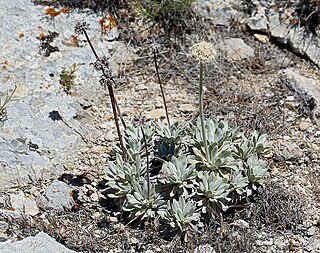
Eriogonum callistum is a rare species of wild buckwheat, known by the common name Tehachapi buckwheat.
Eriogonum evanidum is a rare species of wild buckwheat known by the common name vanishing wild buckwheat. It is native to southern California and Baja California, where it has been collected from widely scattered areas. Most historical occurrences are now extirpated. Some sources suggested that it was probably extinct, but living specimens were rediscovered in 2007.

Eriogonum niveum is a species of flowering plant in the buckwheat family known by the common name snow buckwheat. It is native to the Pacific Northwest of North America, where it occurs in British Columbia, Washington, Oregon, and Idaho. It flowers late in the summer.
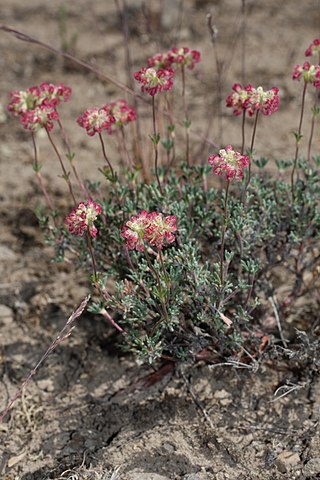
Eriogonum thymoides is a species of flowering plant in the buckwheat family known by the common name thymeleaf wild buckwheat, or simply thymeleaf buckwheat.



















